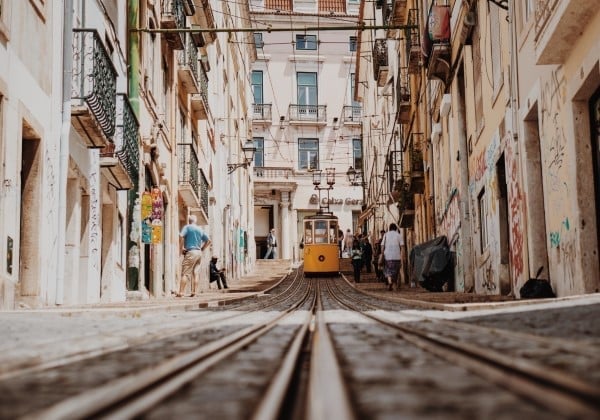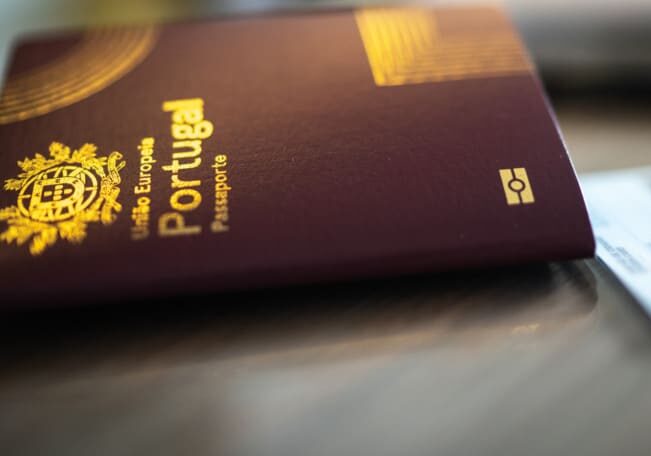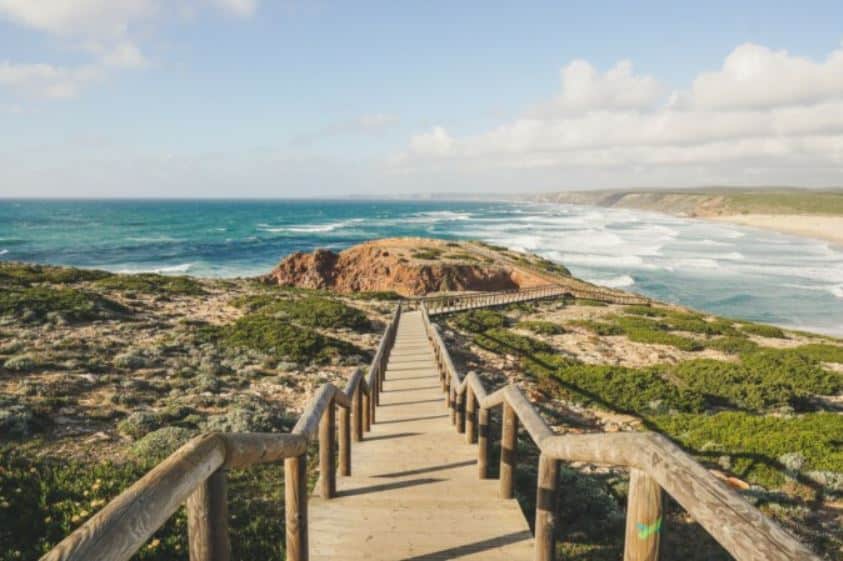Updated: June 26, 2025
If you are seeking to retire to Europe, Portugal should certainly be on your radar. Portugal boasts a high quality of life, is one of the most affordable European countries, and English is widely spoken alongside an excellent healthcare system and accessible residency options.
This ultimate guide will show you how to retire in Portugal, from walking you through residency options and the cost of living to general advice on how to settle into your new life, we have you covered.
Why Is Portugal such a popular retirement destination?
Portugal has been topping retirement indices for years, due to:
- Affordable lifestyle: Considerably more affordable than other Western European countries and US cities
- Friendliness: Portuguese locals are extremely welcoming to foreigners
- English is widely spoken: Portugal ranks sixth in the latest English Proficiency Index
- Safety: Portugal’s seventh in the 2024 Global Peace Index
- Easy European travel: Easy access across the EU area
- Fantastic quality of life: Portugal boasts a high quality of life with excellent healthcare and 300+ days of sunshine
Retiring in Portugal: Pros and Cons
According to the Global Citizen Solutions Intelligence Unit, Portugal is the world’s second-best country for retirees, considering factors like quality of life, safety, integration, and economics. In a nutshell, here are the main pros and cons to weigh up when making your decision:
Pros of retiring in Portugal
- A high-quality public healthcare system with world-class private healthcare options
- Low cost of living compared to the USA and other Western European countries
- Value-for-money property options
- Straightforward retirement visa application options
- Ease of transportation
- Excellent dining options
- Pleasant weather
- Ample entertainment and leisure activities, like golfing, kayaking, theatre, and the cinema
- Luxury retirement villages, assisted living, and luxury care homes in Portugal
- Rich in culture
- Modern amenities
- Friendly locals with a large English-speaking population
- Stunning beaches and natural landscapes
- Ease of travel to other European destinations
Cons of retiring in Portugal
- Older buildings might not have central heating, which could make winter nights chilly – make sure your property has good insulation.
- Some stores do not accept cashless payments like Visa and Mastercard, so it can be a good idea to always carry some cash, just in case.
- Bureaucracy and long waiting times at government departments
- The need to learn a little Portuguese to communicate in areas that do not see many tourists and expats.
How to Retire in Portugal: Residency and Visa Options for EU and Non EU Citizens
Anyone can retire in Portugal, but the process varies based on nationality. European Union (EU) nationals, European Economic Area nationals, and Swiss nationals can reside freely, with EU nationals only needing to get a Certificate of Registration after three months.
Non-EU nationals, however, must obtain a visa or residency permit to retire in the country, but the process is largely straightforward. Let’s take a closer look at a few of your residency options below.
Portugal D7 Visa

Your passive income can be from a pension scheme, retirement savings, or any other social security benefits in your home country.
In order to apply for the visa, you need to:
- Be a non-EU national
- Earn a passive income of at least €820 per month (your income can be pension income, social security benefit, transferable equity, real estate, intellectual property, or financial equity)
- Show proof of a place to live in Portugal
- Be willing to reside for more than 183 consecutive days per calendar year in Portugal
Portugal Golden Visa Program

The current investment options are as follows:
- Scientific research: Minimum €500,000 investment in science or technology research.
- Subscription to a qualified investment fund: Contribute at least €500,000.
- Job creation: The incorporation of a company and the creation of ten jobs worth at least €500,000.
- Donation: Make a minimum €250,000 donation to support the arts or the restoration of national heritage.
If you meet all the requirements to become an EU citizen under Portuguese nationality law, you can apply for permanent residency and Portuguese citizenship after five years. As a Portuguese citizen, you will have several benefits, including voting in Portugal and membership in the EU. Portugal provides dual citizenship as well.
Cost of Living and Housing in Portugal
Portugal is known for being one of the most affordable European countries without compromising on the overall quality of life it offers.
If you are retiring in Portugal as an American, the cost of living in Portugal, including rent, is around 33 percent lower than in the USA. Not including rent or mortgage payments, a couple should be able to comfortably retire in Portugal with an annual income of between €15,536 and €17,263 ($18,000 and $20,000) if talking about outside major cities, and up to €20,716+ ($24,000+) in major cities, although this will depend on your lifestyle.
In comparison to the US and other Western European countries, eating out is quite affordable, daily essentials are fairly priced, and the produce is of very high quality in Portugal. The country is known for its extensive coastline, and the fish and seafood are excellent. Note that shopping locally for daily essentials is more cost-effective than purchasing foreign goods.
Here is a more specific breakdown of the costs of some of the goods and services in Portugal to give you a better idea of what you could expect to pay:
Costs | Lisbon | Porto | New York, USA | Washington D.C., USA | San Francisco, USA |
Utilities (915 sq. ft.) | $147 (€128) | $125 (€115) | $181 (€167) | $209 (€193) | $221 (€204) |
Rent (1BR, city center) | $1,472 (€1,402) | $1,073 (€1,021) | $3,866 (€3,558) | $2,800 (€2,578) | $2,264 (€2,080) |
Rent (1BR, outside center) | $1,133 (€1,079) | $846 (€805) | $2,735 (€2,319) | $2,300 (€2,117) | $2,659 (€2,519) |
Meal (inexpensive restaurant) | $13 (€12) | $13 (€12) | $20 (€18) | $20 (€18) | $20 (€18) |
Meal (mid-range restaurant) | $33 (€30) | $27 (€25) | $50 (€46) | $40 (€37) | $50 (€46) |
Fitness Club | $42 (€40) | $37 (€35) | $70 (€65) | $70 (€65) | $85 (€79) |
Groceries (monthly, per person) | $250 (€230) | $230 (€210) | $550 (€505) | $500 (€460) | $520 (€475) |
Buying a property in Portugal
If you are considering buying property in Portugal, below you can find average property prices for popular regions. This information is from the Portuguese real estate databank Confidencial Imobiliário.
- Lisbon (City): €6,934 per m²
- Lisbon Metropolitan Area: €4,935 per m²
- Porto (City): €4,883 per m²
- Porto Metropolitan Area: €3,937 per m²
- Algarve: €4,385 per m²
- Alentejo: €3,181 per m²
Access to Healthcare
 Public healthcare
Public healthcare
The National Health Service, or Serviço Nacional de Saúde (SNS), provides excellent free healthcare to children under 18 and people over 65. If you are a resident of Portugal, you will have access to the national health service and will only need to pay the minimum healthcare costs for treatment. Note that for X-rays, scans, and other tests, you will need to pay an additional fee. Private healthcare is also an option and is becoming increasingly popular with expats in Portugal.
If you are retiring to Portugal, rest assured that the Integrated Medical Emergency System offers very quick response times.
Portugal’s healthcare system provides fundamental health, accident, and disease coverage. Portugal has high-quality healthcare: the country is ranked 23rd in the Global Health Care Index 2025. Both public and private hospitals are contemporary and well-equipped, and many medical professionals in both institutions speak English.
In Portuguese pharmacies, prescription drugs can be given out right away. With a few exceptions, the price of many generic medications ranges from 10 percent to 25 percent less than what they would be in the United States.
Private healthcare
Private healthcare in Portugal is excellent and affordable, with English widely spoken and quicker waiting times.
Americans retiring in Portugal will find that healthcare is very affordable. Depending on your age and the scope of your coverage, private health insurance could cost between €30 and €60 every month for basic healthcare plans. On the opposite end of the price range, prices for more comprehensive private health insurance plans could cost up to several hundred euros each month.
You can read more about healthcare in Portugal to get everything that you will need to know about the healthcare system in Portugal, including private health insurance and the public health service.
Taxes for Retirees in Portugal
- Taxation on worldwide income: Regarding your worldwide income, you are considered a Portuguese tax resident if you spend more than 183 days in Portugal annually. All income must be reported.
- Portugal has Double Tax Agreements (DTAs) with both EU and non-EU nations, making sure your income is not taxed twice. Portugal has a DTA with the USA and the UK.
- We recommend working with an accountant to optimize your tax affairs in Portugal.
Transferring Pensions to Portugal: Key Points
- EU Citizens: For EU citizens, you can transfer your social security contributions from other EU countries to Portugal. These combined years will count towards your Portuguese public pension eligibility.
- Non-EU Citizens: If you’re a non-EU national, you will need to check your existing social security or pension agreements between Portugal and your home country. These agreements dictate how your contributions or pensions may be recognized.
Portuguese retirement age: The retirement age in Portugal is 66 years and seven months for both men and women in 2025 (to increase to 66 years and nine months in 2026).
Pension options
Portugal has a public state pension system. You can find out more on the Portugeuse government website. For private pensions, plans are widely available and often supplement state pensions.
If you become a tax resident in Portugal, your foreign pension may be subject to taxation. This will depend on DTAs between Portugal and the country from which your pension is paid. We advise seeking tax advice for your specific situation.
Opening a Bank Account in Portugal: Step by Step Guide
Step 1. Get a NIF
When moving to the country, you will need to have a NIF number (Portuguese Tax Identification Number or Número de Identificação Fiscal), which is required to open a Portuguese bank account and carry out major financial transactions.
How to get it: To get a NIF, you will need to bring your passport and proof of address to your local Finanças office (Portuguese Government Tax Office). If you already live in the country, you may provide your Portuguese address. If your address is outside of Portugal, you will also need to have a tax agent in Portugal to act on your behalf.
Step 2. Gather your documents
ID: Valid passport or national ID card
Proof of address: Recent utility bill or rental agreement.
Proof of income: Recent payslip, employment contract, or proof of pension.
Portuguese NIF number: Your tax identification number, as obtained in step 1.
Step 3. Open a Portuguese bank account
To open a local bank account, visit the local branch, although some banks allow you to set up an account online. Millennium BCP, Novo Banco, Banco BPI, and Banco Santander Totta are some of the best banks to consider in Portugal. While many employees in banks speak English, it can be worth speaking some basic Portuguese.
Living in Portugal for Retirees: Practical Information
Moving to another country can be a hassle, and there are several things that you will need to consider.
Transportation in Portugal
While traveling by car is probably the easiest way to get around the country, Portugal has excellent transport links from Northern Portugal to the Algarve in the south that are both efficient and cheap – both trains, buses, and the metro are each convenient to use – just excuse the times when the buses are running slightly late. There are also three international airports on Continental Portugal – in Lisbon, Porto, and Faro – making it easy to make foreign trips.
Inheritance tax for retirees in Portugal
Portugal does not impose an inheritance tax on real estate. However, there is a 10 percent flat-rate stamp fee. Unless otherwise specified, spouses, descendants, and parents are not subject to this payment. The process of inheritance also involves a little administrative cost.
Any succession process must follow the rules of the nation where the deceased person resided, according to the Portuguese Civil Code. US inheritance law will be in effect if you retire from the US to Portugal. If the other spouses are Portuguese permanent residents, Portuguese law may still be applicable if both spouses are foreign nationals. By mentioning it in the will, this can be prevented. Make sure you create a thorough will that has been approved by a lawyer. Having separate wills in Portugal and the place of origin may be even better for retirees from the US, UK, Australia, and Canada.
Lifestyle in Portugal: What to expect
It is very easy to move to Portugal and live an active lifestyle. With the Portuguese climate – 300 days of sunny days per year, mild temperatures in the winter months, and even the winter sun encouraging you to go outside – you can easily live a very active lifestyle.
There are many watersport activities that you can try. For those who prefer to keep their feet on dry land, the golf courses in Portugal are some of the finest in the world. Activities range from yoga to cooking classes and everything in between.
The cuisine of Portugal is also generally very healthy, despite the Portuguese sweet tooth and love of pastries – try the famous pastel de nata or bola de berlim and you should see why. The cuisine has a strong focus on fresh fish, salads, and fruits, making it very easy to keep up a healthy and active lifestyle.
Best Places to Retire in Portugal
There are many beautiful locations in Portugal. Each will have its own traditions, cultures, foods, and individual quirks. Finding the perfect location for you is one of the first things that you should consider when retiring in Portugal.
The Algarve
- Consistently ranks as one of the best retirement destinations in the world by Forbes
- English is widely spoken
- 300+ days of sunshine per year
- Beautiful beaches, 39 golf courses, waterspots, and delicious gastronomy
- Great healthcare options, relaxed lifestyle, and high quality of life
- Towns such as Tavira, Faro, Silves, and Lagos offer excellent property options by the coast
Lisbon
- Portugal’s capital is the perfect mix of tradition and innovation
- An array of cultural activities and events for retirees to enjoy
- Easy access to terrific beaches
- Popular neighborhoods include Estrela, Belem, Campo do Ourique, and Principe Real
- Home to many UNESCO World Heritage Sites, rich arts, and incredible restaurants
Cascais
- Sophisticated coastal town strategically located just 30 minutes from Lisbon, combining beautiful beaches with city convenience
- Charming town with a local feel and home to elegant buildings and unique architecture
- A growing expat community and modern amenities
- The perfect place for luxury lifestyle buyers
Porto
- Portugal’s second-largest city is now one of the best European cities to retire to
- Known for its riverside beauty, port wine culture, and UNESCO historic center
- Quieter and more affordable cost of living than Lisbon
- One of Portugal’s true gems, with a strong expat community and laid-back lifestyle
- Perfect for retirees seeking a milder climate
Bottom Line
Retiring in Portugal in 2025 is a dream for many—and with good reason! Whether you’re drawn to the golden beaches of the Algarve region, the buzz of Lisbon, or the charm of Porto, there’s a perfect spot for everyone. To make the move stress-free, start by getting familiar with residency requirements, especially if you’re coming from outside the EU, as visas can take time.
Budgeting is key, too. While Portugal offers an affordable lifestyle, costs can vary depending on where you settle. Picking up some basic Portuguese will go a long way toward helping you feel at home (and impressing the locals!). And don’t forget healthcare—Portugal’s system is excellent, but having private health insurance can give you peace of mind.
Before you take the plunge, spend some time exploring different areas to find your ideal fit. With its warm Portuguese culture, relaxed lifestyle, and stunning scenery, retiring in Portugal might just be the best decision you ever make!
Goldcrest is a buyer’s agent that is based in Lisbon. We provide expert, impartial advice on real estate investments and how to buy property in Portugal. From scouting out the perfect property through to property acquisition, we have you covered throughout the process. If you are looking to purchase property in Portugal, don’t hesitate to get in touch. Our team of skilled experts is available to solve all your real estate doubts, helping you with the property search and offering insightful expertise and strategic advice.Goldcrest: How We Can Help You
Why choose Goldcrest?
Frequently Asked Questions about Retiring in Portugal:
Is Portugal a good country to retire to?
Yes, Portugal is a good country to retire to. You have beautiful landscapes, beaches, and cities, and can embrace the rich, historic Portuguese culture. There are many different residency visa options on the table, including the Portugal Golden Visa program and D7 Visa (passive income visa or Portugal retirement visa) for non-EU citizens.
Where is the best place to retire in Portugal?
For the best places to retire in Portugal consider Lisbon and Porto if you are looking for a good life in the city. Cascais is an excellent location a short 30-minute drive from Lisbon. Consider the Algarve region for a relaxed retirement with plenty of beaches and golf courses.
For historic flair, the towns of Braga, Guimaraes, and Ponte de Lima are for you, and the Silver Coast provide a more authentic side to Portugal, which is also worth exploring. The autonomous islands of Madeira and the Azores are each excellent options, for those seeking more peace and tranquility.
Is it easy to move to Portugal?
It is relatively easy to move to Portugal, one of the most affordable European countries. However, as with moving to any country, it is important to know the steps that you will need to take when buying.
To retire abroad to Portugal as a non-EU national, you will need to apply for Portuguese residency and secure a valid residence permit. From the Portugal Golden Visa to the D7 Visa (Passive Income Visa), there are different options on the table to get a residence permit. With the D7 Visa, it is possible that you can live off your pension income or retirement savings, while with the Golden Visa, you need to make a minimum investment into the country – with a variety of options on the table.
how much does it cost to retire in Portugal?
A family of four’s estimated monthly costs are €2,411 ($2,776) without rent, while a single person’s estimated monthly costs are €682 ($786) without rent. Note that how much you’ll need to live comfortably in Portugal strongly depends on your lifestyle.
What is the retirement age in Portugal?
The Portugal retirement age is 66 years and seven months.
Can a US citizen retire in Portugal?
Yes retiring in Portugal as an American is certainly possible, but you will need to apply for Portuguese residency. Some good visa options to consider for retirees include the D7 Visa, D8 Visa, or the Portugal Golden Visa. The process is straightforward but may take some time.
What are the downsides of retiring in Portugal?
Cons of relocating to Portugal include a slower pace of life, lower salaries compared to other European Union (EU) nations, the absence of central heating in many homes, and sometimes slow bureaucracy. Having a basic command of Portuguese will also make integrating into Portuguese society easier.
What is the process of retirement in Portugal for EU citizens?
European Union (EU) citizens will be able to move to Portugal relatively easily. They will be able to establish residence in the country. After three months, they will need to secure a registration certificate at their local council.
Can you retire in Portugal from the UK?
While you can buy a property with no restrictions, for a UK citizen to live in Portugal for more than three months (within a six-month period), they will need to secure a residence permit. This can be through the D7 Visa, Portugal Golden Visa, or other residency permit options. The D7 Visa is a popular option for retirees to secure a residence permit. The D7 Visa is also referred to as the Portugal retirement visa or the passive income visa.
How to retire to Portugal as a foreigner?
Foreigners can retire to Portugal by applying for the D7 Visa or the Portugal Golden Visa. The process involves gathering required documents, securing a residency visa, and ensuring you have healthcare services coverage.
Is healthcare free in Portugal?
Portugal’s National Health Service or Serviço Nacional de Saúde (SNS) provides free healthcare to children under 18 and people over 65, in addition to providing generally free healthcare for basic health needs to citizens and residents, with minimal costs for some treatments.
How can I get Portugal retirement visa?
You can get a D7 Visa, or Portugal Retirement Visa by meeting the following requirements:
- Be a non-EU national
- Earn a passive income of at least €820 per month (your income can be pension income, social security benefit, transferable equity, real estate, intellectual property, or financial equity)
- Show proof of a place to live in Portugal
- Be willing to reside for more than 183 consecutive days per calendar year in Portugal
Can I live in Portugal as a US citizen?
A US citizen can enter Portugal and remain for 90 days without a visa. For an American to live in Portugal, you need to apply for a visa, then apply for residency with the Portuguese government. Popular visa options for US citizens include the D2 Visa, D7 Visa, D8 Visa, and the Portugal Golden Visa.
Can American expats in Portugal obtain Portuguese citizenship?
Yes, dual citizenship is permitted between Portugal and the United States of America. You can apply for citizenship after five years of residence in Portugal. Similar to when applying for permanent residency, you must demonstrate that you speak a little Portuguese by passing an A2 Portuguese language test.
Can you retire in Portugal from Canada?
Yes, you can retire in Portugal from Canada by applying for Portuguese residency. Popular visa options for retirees include the D7 Visa and the Portugal Golden Visa.
Can you retire in Portugal from Australia?
Yes, you can retire in Portugal from Australia, you will just need to apply for Portuguese residency. Popular visa options for retirees include the D7 Visa and the Portugal Golden Visa.
How much do I need to retire in Portugal in 2024?
One person can comfortably retire in Portugal with an income between €1,800 ($2,070) and €2,400 ($2,7760) per month – even less if you avoid the more expensive major cities and neighborhoods. Keep in mind that this will vary depending on your lifestyle and choice of housing.
What are the pros and cons of retiring to Portugal?
Pros of retiring in Portugal:
- A high-quality public healthcare system with world-class private healthcare options
- Seventh safest country in the world
- Low cost of living
- Value-for-money property options
- Straightforward retirement visa application options
- Ease of transportation
- Excellent dining options
- Pleasant climate
- Ample entertainment and leisure activities, like golfing, kayaking, theatre, and the cinema
- Luxury retirement villages and assisted living
- Friendly locals with a large English-speaking population
- Stunning beaches and natural landscapes
- Ease of travel to other European destinations
Cons of retiring in Portugal
- Older buildings might not have central heating, which could make winter nights chilly
- Some stores do not accept cashless payments like Visa and Mastercard and there is a need to carry cash on you
- Bureaucracy and long waiting times at government departments
- The need to learn a little Portuguese to communicate in areas that do not see many tourists and expats
Besides Portugal, where else can you retire abroad?
Other popular areas to retire to besides Portugal include Spain, Greece, the Netherlands, Costa Rica, and Mexico
Do I need to speak Portuguese when retiring in Portugal?
While learning basic Portuguese will undoubtedly come in handy when retiring in Portugal, especially for integrating into the culture of the country, a large portion of the Portuguese population speaks English very well and you will be able to get by without being fluent in the local language.
How is the healthcare system in Portugal?
Portugal holds the 23rd spot in Numbeo’s 2025 Global Health Care Index, showcasing its status as one of the top healthcare systems worldwide. Its hybrid system combines high-quality public and private healthcare, with private options being notably affordable compared to other Western European countries.
Are there family reunification benefits to retiring in Portugal?
Yes, retiring in Portugal offers family reunification benefits. As an EU citizen or resident, you can bring close family members, such as a spouse, children, or dependent relatives, to join you and live in Portugal.
What are the social security benefits when retiring in Portugal?
Social security benefits in Portugal include a contribution-based state pension. We recommend you reach out to a financial advisor to ensure you meet the requirements for this benefit.
Why is retiring in Portugal such a popular option for foreigners?
The high quality of life, affordable cost of living, excellent healthcare, gorgeous sights, and retirement-friendly activities and sports make Portugal the popular retirement haven it is.
What's the difference between holding permanent residency and Portuguese citizenship?
The key difference between permanent residency and Portuguese citizenship lies in the rights and privileges they offer. Citizenship provides additional benefits, including political rights like voting and broader travel rights, while permanent residency mainly grants the right to live and work in Portugal.
What are the most important considerations for foreigners retiring in Portugal?
The main consideration for retiring in Portugal should be your residency and visa options to ensure you can live in Portugal long-term. You’ll also need to ensure your income is enough to sustain you based on Portugal’s cost of living. Taxes, the Portuguese lifestyle, the location you would want to live in, and the ins and outs of the healthcare system are also good things to research and consider when retiring in the country.
Can American retirees move to Portugal?
Wondering how to retire in Portugal from the US? Most retirees apply for the D7 visa, which is designed for individuals with a stable passive income such as pensions or investments. This visa allows you to live in Portugal long-term and eventually apply for permanent residency or citizenship.
Is it hard for an American to retire in Portugal?
Retiring in Portugal as an American is straightforward, mainly via the D7 Visa. This requires demonstrating passive income and a clean criminal record. After obtaining a residence permit, you can apply for permanent residency and citizenship provided you meet the requirements.
Does Portugal tax US retirement income?
If you’re a tax resident, meaning that you spend more than 183 days in Portugal, you will be taxed on your worldwide income. However, Portugal does have Double Tax Agreements (DTAs) with both many countries, making sure your income is not taxed twice.


 Public healthcare
Public healthcare